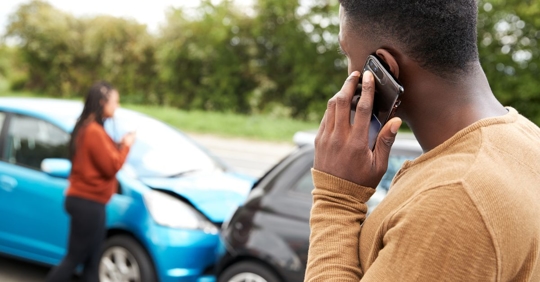Car accidents can happen to anyone at any time, and understanding the common causes of these accidents and who may be at fault is crucial for both drivers and pedestrians. By being aware of these factors, we can take proactive measures to prevent accidents and ensure the safety of ourselves and others on the road. In this blog, we will explore five common causes of car accidents and provide practical tips on how to determine fault in each situation.
1. Distracted Driving
One of the leading causes of car accidents is distracted driving. This includes activities such as texting, talking on the phone, adjusting the radio, or engaging in any behavior that diverts attention from the road. When a driver's focus is not on driving, the risk of accidents significantly increases.
Determining Fault: In cases of distracted driving, determining fault often relies on evidence such as phone records, witness statements, and police reports. If a driver was engaging in distracting activities at the time of the accident, they may be held responsible.
2. Speeding
Excessive speeding is a major contributor to car accidents. Driving above the speed limit reduces the time a driver has to react to unexpected situations, increases stopping distances, and intensifies the impact in case of a collision.
Determining Fault: Speeding violations are typically documented in police reports, and evidence such as skid marks or the severity of impact can help establish if excessive speed was a factor in the accident.
3. Reckless Driving
Reckless driving encompasses a range of dangerous behaviors, including aggressive driving, tailgating, and weaving in and out of traffic. Such actions significantly raise the risk of accidents.
Determining Fault: Eyewitness accounts, traffic camera footage, and the behavior of drivers involved can help establish reckless driving as a factor. Traffic violations and police reports are also critical pieces of evidence.
4. Driving Under the Influence (DUI)
Driving under the influence of alcohol or drugs impairs a driver's judgment, coordination, and reaction times, making accidents more likely to occur.
Determining Fault: DUI cases are often determined by the results of breathalyzer or blood tests, eyewitness accounts, and police reports. If a driver is found to be under the influence, they are typically considered at fault.
5. Poor Weather Conditions
Adverse weather conditions, such as rain, snow, ice, or fog, can contribute to car accidents. Reduced visibility and slippery road surfaces make it challenging for drivers to maintain control of their vehicles.
Determining Fault: Weather-related accidents may not always have a clear at-fault party. However, drivers are expected to adjust their driving to the prevailing conditions. Failure to do so could result in shared fault or negligence.
6. Running Red Lights & Stop Signs
Disregarding traffic signals and signs is a common cause of intersection accidents. Running red lights or stop signs can lead to T-bone collisions or side-impact accidents.
Determining Fault: Traffic camera footage, eyewitness accounts, and police reports are crucial in determining whether a driver ran a red light or failed to stop at a sign.
7. Fatigue
Fatigued driving is a serious safety concern. Exhausted drivers may experience impaired reaction times, reduced alertness, and an increased likelihood of falling asleep at the wheel.
Determining Fault: Statements from the involved drivers, witness accounts, and sometimes, cellphone records can help establish whether fatigue was a factor in the accident.
8. Poor Road Conditions
Inadequate road maintenance, potholes, or lack of proper signage can contribute to accidents. Government entities responsible for road upkeep may be held liable in such cases.
Determining Fault: Establishing fault in cases of poor road conditions may involve investigations into the history of maintenance, reports of previous accidents at the location, and expert testimony.
Rossman, Baumberger, Reboso & Spier, P.A. Has Your Back Following a Car Accident
By understanding these common causes of car accidents and the process of determining fault, we can all contribute to safer roads. Remember, prevention is key, and being a responsible driver means being aware of potential hazards and taking appropriate actions to avoid accidents.
At Rossman, Baumberger, Reboso & Spier, P.A., we understand the devastating consequences of car accidents. Our experienced team of attorneys is dedicated to helping accident victims seek justice and fair compensation. If you or a loved one has been involved in a car accident, contact us today for a free consultation.
Give us a call at (305) 900-5493 or send us a message online.

